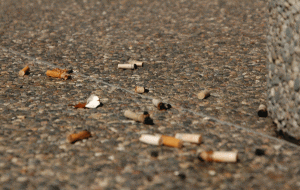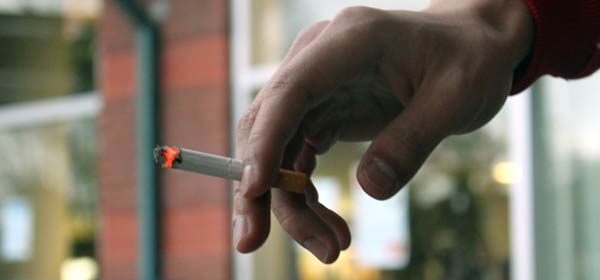Smoke up, life’s short?
September 21, 2010 by Stu Gallacher · Leave a Comment

A new bylaw went into effect on Sept. 1, prohibiting smokers from lighting up in public parks and on beaches in Vancouver — excluding Wreck Beach, of course.
In a string of initiatives to deter smoking, the new ban is just another drop in the bucket. The bucket, however, is getting pretty full. How long will it be until the right to smoke a cigarette in Vancouver is abolished?
Then again, if the impact of smoking in Vancouver is so harsh and uncompromising, perhaps there’s a greater issue at stake. Why not just make it illegal?
Smoking does appear to be falling into a category of socially unacceptable behaviour, akin to shooting heroin and smoking meth. These days, the satisfaction from inhaling a cigarette in public is rivaled by the ethical judgments of a preeminent non-smoking community.
Besides, how long would it really take for devout smokers, and casual smokers alike, to kick the habit if cigarettes were taken off the market? There’s no shortage of healthy alternatives readily available to fill the void: yoga, swimming, coffee, breathing fresh air. The list goes on. Sadly, they don’t possess all the toxic qualities cigarettes do, and are therefore significantly less attractive pastimes. But why not give it a shot?
Indeed, cigarettes have been around for eons. But change is inevitable. So rather than looking at the new bylaw as a retraction of some inherent spiritual liberty, let’s consider the possibility that the concerned, health-conscious and politically active are genuinely trying to save us from ourselves, one step at a time.
• • •
Here’s what a few students on the Richmond campus had to say about the issue:
Marianna Vilchinsky
Age: 19
Program: General studies
Smoker: Yes
“I think it’s good. If you don’t smoke, I don’t think you should be surrounded by it. But I don’t think it should be banned because it’s still your personal choice.”
Cassidy Scott
Age: 18
Program: Journalism
Smoker: No
“It’s not even politically correct to smoke.”
Kimiya Shokoohi
Age: 20
Program: Journalism
Smoker: Casual
“As a social smoker, I feel like we smoke when we’re having a good time, when we’re out at beaches, when we’re out at parks and together there. So it kind of takes away that activity. It does take away people’s right to smoke, as a smoker and as an individual. Who is anyone to tell me what I can and can’t do?”
Megan Mcnee
Age: 20
Program: Interior design
Smoker: Yes
“I think it’s getting to the point where it could be illegal, in the next decade or so. I wouldn’t say smoking is irreplaceable, but it’s better than doing hard drugs. I suppose you could get physically active, but I prefer smoking.”
Veronica Fraczyk
Age: 26
Program: Accounting
Smoker: No
“I don’t think it’s going to do much. People are going to smoke if they want to. It’s a very serious addiction, and I think they’ll find a way to get around it. I would absolutely vote to get [smoking] off the market.”
KSA rolling papers a doob-ious affair
November 5, 2009 by Jacob Zinn · Leave a Comment

The KSA sells cigarette papers, but don't intend them to be used solely for tobacco. (Jacob Zinn photo)
The Kwantlen Student Association maintains that selling Zig-Zags (paper used to roll tobacco cigarettes and joints) does not conflict with the university promoting anti-smoking products under the student health plan.
Though selling cigarette paper seems to contradict a recent on-campus anti-smoking event, the KSA said it has to provide items for both smokers and non-smokers.
“If people want to smoke medical marijuana, they can,†said Nathan Griffiths, KSA Director of Operations. “If they want to quit smoking tobacco, we’ve provided products to try and have them stop.â€
Griffiths said he doesn’t feel the paper sales are hypocritical in light of the anti-smoking products.
“Currently, we also offer insulin on our health plan, but we still sell Coke, other junk food within the cafe, so I don’t see much of a difference,†said Griffiths.
The concerns of inconsistency on the subject came up during initial KSA talks about supplying Zig-Zag rolling papers.
“We discussed this when we started doing the rolling papers,†said John O’Brian of the Cloverdale KSA. “It was a plebiscite about the legalization of marijuana and it was sort of a close margin.â€
O’Brian said he thought the school would never sell rolling papers, but student demand prompted the sale of Zig-Zags. In the October 2003 plebiscite, out of 784 students who voted, 470 supported the decriminalization of marijuana.
The papers were introduced to the Cloverdale campus in March of this year and then at other campuses.
The separation of Zig-Zag papers from anti-smoking products comes from the concept of not using the cigarette paper to roll cigarettes.
“We don’t intend for them to be used to smoke tobacco,†said O’Brian.
The KSA hasn’t taken a stance on the decriminalization of marijuana, but it does support medical marijuana. Those who smoke marijuana recreationally are not restricted from buying Zig-Zags.
Dr. Balbir Gurm of Kwantlen’s nursing program said she understands the KSA has to support services for smokers, but hopes it doesn’t send mixed messages.
“I think what they have to do is keep the message clear that yes, we want to support people who want to quit smoking, but we can’t turn our backs on those of our members to choose to smoke,†said Gurm.
The sales haven’t really caught on; to date, Cloverdale has sold 32 packs and Surrey has sold 25, with 100 papers to a pack. The Richmond campus hasn’t sold many Zig-Zags and sales at the Langley campus have been discontinued after none were sold.
Because sales have been slow, original plans to add the KSA logo to the papers have been scrapped.
“We were testing to see if they were going to be popular enough,†said O’Brian, who added that even if the papers sold well, a local printing company no longer puts logos on cigarette papers.


